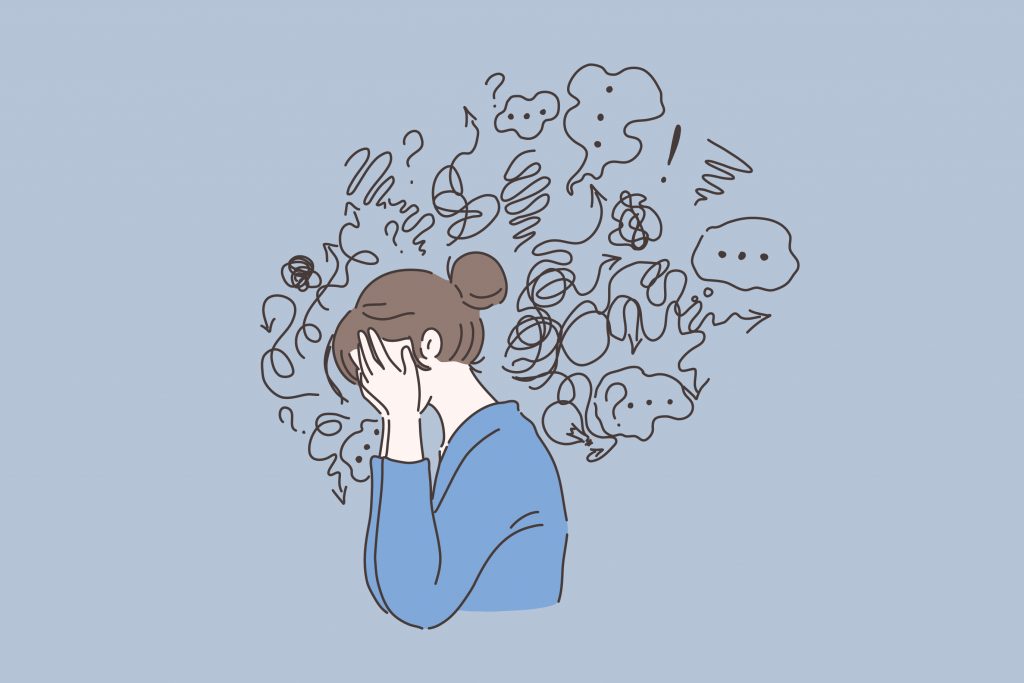Anxiety can have a significant impact on various aspects of our lives, including our appetite. When faced with overwhelming stress and worry, many people experience changes in their eating habits. While some individuals may find themselves losing their appetite during anxious periods, others may experience an increased desire to eat.
Understanding the connection between anxiety and appetite can help shed light on these reactions and provide guidance on how to manage these changes.
Understanding Anxiety and Its Effects on the Body
Defining Anxiety: A Brief Overview
Anxiety is a natural response to stressful situations, helping to prepare our bodies for potential dangers. It is important to distinguish between normal levels of anxiety and an anxiety disorder, which involves persistent and excessive worry that significantly impacts daily functioning. Anxiety can cause physical symptoms such as rapid heartbeat, shortness of breath, and muscle tension.
But what exactly happens in our bodies when we experience anxiety? When we encounter a stressful situation, our brain triggers the release of stress hormones, such as cortisol and adrenaline. These hormones prepare our body for a “fight or flight” response, increasing our heart rate, dilating our pupils, and sharpening our senses. This physiological response is designed to help us survive in dangerous situations.
However, when anxiety becomes chronic, it can have detrimental effects on our physical health. The mind and body are intricately connected, and changes in one can often manifest in the other. When anxiety persists over a long period of time, it can disrupt various bodily systems, including the digestive system, which plays a vital role in appetite regulation.
How Anxiety Impacts Physical Health
Anxiety not only affects our mental well-being but also has consequences on our physical health. When we are constantly in a state of anxiety, our body’s stress response remains activated, leading to a range of physical symptoms and health issues.
One of the most common physical symptoms of anxiety is muscle tension. When we are anxious, our muscles tend to tighten up, which can cause discomfort and even pain. This tension can be particularly noticeable in the neck, shoulders, and back. Over time, chronic muscle tension can lead to musculoskeletal problems and contribute to conditions such as tension headaches and back pain.
In addition to muscle tension, anxiety can also affect our cardiovascular system. When we experience anxiety, our heart rate increases, and our blood vessels constrict. This can lead to elevated blood pressure and put a strain on the heart. Prolonged periods of anxiety can increase the risk of developing cardiovascular diseases, such as hypertension and heart disease.
Furthermore, anxiety can disrupt our sleep patterns, leading to sleep disturbances and insomnia. Lack of quality sleep can have a negative impact on our overall health and well-being. It can weaken our immune system, impair cognitive function, and increase the risk of developing chronic conditions like diabetes and obesity.
Another area of the body that can be affected by anxiety is the gastrointestinal system. When we are anxious, our body diverts blood flow away from the digestive organs, which can lead to digestive issues such as stomachaches, bloating, and diarrhea. Chronic anxiety can also contribute to the development of gastrointestinal disorders, such as irritable bowel syndrome (IBS) and inflammatory bowel disease (IBD).
It is important to note that the impact of anxiety on physical health can vary from person to person. Some individuals may be more susceptible to certain physical symptoms, while others may experience different effects. It is crucial to seek professional help if anxiety is significantly impacting your daily life and overall well-being.
The Connection Between Anxiety and Appetite
The Role of Stress Hormones in Appetite Regulation
When anxiety triggers our body’s stress response, it sets off a cascade of physiological reactions. One of the key players in this process is the release of stress hormones, such as cortisol and adrenaline. These hormones prepare us for the “fight or flight” response, which can temporarily suppress our appetite.
The body’s evolutionary response to stress is to prioritize immediate survival over other bodily functions, including digestion. In times of stress, the body redirects its resources towards the systems that are essential for immediate survival, such as the cardiovascular and muscular systems. As a result, the digestive system takes a back seat, leading to a decrease in hunger.
Furthermore, stress hormones can directly affect the brain regions responsible for appetite regulation. Cortisol, for example, can influence the hypothalamus, a region of the brain that plays a crucial role in regulating hunger and satiety. This hormonal influence can disrupt the normal signaling pathways involved in appetite regulation, further contributing to a decrease in appetite.
Anxiety and Digestive System: A Complex Relationship
The relationship between anxiety and the digestive system goes beyond temporary appetite suppression. Chronic anxiety can have a profound impact on the normal functioning of the digestive tract, leading to a range of gastrointestinal symptoms.
One common manifestation of anxiety-related digestive issues is nausea. The constant state of worry and tension associated with anxiety can trigger an overactive response in the digestive system, leading to feelings of queasiness and an aversion to food. Additionally, anxiety can cause the muscles in the stomach and intestines to contract more forcefully, resulting in stomach cramps and discomfort.
Another common gastrointestinal symptom experienced by individuals with anxiety is diarrhea. Anxiety can stimulate the release of certain neurotransmitters and hormones that can speed up the movement of food through the digestive tract. This accelerated transit time can lead to loose stools and an increased frequency of bowel movements.
The relationship between anxiety and appetite is highly individualized, and different individuals may experience varying degrees of appetite changes in response to anxiety. Some individuals may find that their appetite increases during times of stress, while others may experience a complete loss of appetite.
Why Some People Lose Appetite During Anxiety
The Fight or Flight Response and Appetite Loss
When faced with a perceived threat or intense anxiety, our body’s fight or flight response kicks in. This response triggers a surge of adrenaline, which can dampen hunger signals. The body’s focus switches to survival, diverting energy away from non-essential functions such as digestion and appetite.
Psychological Factors Contributing to Appetite Loss
Anxiety can also affect appetite on a psychological level. Excessive worry, fear, and emotional distress can lead to a loss of interest in food. Individuals may find it challenging to eat when their mind is consumed by anxious thoughts, making food feel unappealing or even inducing feelings of nausea.
Why Some People Gain Appetite During Anxiety
Emotional Eating: A Response to Anxiety
While some people may lose their appetite during anxious periods, others find solace in food. Emotional eating can be a coping mechanism for managing stress and anxiety. Consuming comfort foods can provide temporary relief or a distraction from overwhelming emotions, leading to an increased desire to eat.
The Role of Cortisol in Appetite Increase
Cortisol, a hormone released during stressful situations, can also contribute to increased appetite. Elevated cortisol levels can trigger cravings for high-calorie and carbohydrate-rich foods. These types of foods temporarily boost serotonin, a mood-enhancing neurotransmitter linked to feelings of calmness and happiness.
Managing Anxiety-Related Appetite Changes
Professional Treatments for Anxiety and Appetite Issues
If anxiety is significantly impacting appetite and overall well-being, it is crucial to seek professional help. Mental health professionals can provide various treatment options, including therapy and medication, to alleviate anxiety symptoms and restore a healthy relationship with food.
Self-Care Strategies for Anxiety and Appetite Regulation
Alongside professional help, implementing self-care strategies can also contribute to managing anxiety-related appetite changes. Engaging in regular exercise, practicing relaxation techniques such as deep breathing or meditation, maintaining a balanced diet, and getting sufficient sleep can all help reduce anxiety levels and promote a healthier appetite.
Parting Thoughts
In conclusion, anxiety can indeed make you lose your appetite for various reasons. Understanding the impact of anxiety on the body, particularly the interplay between stress hormones, the digestive system, and psychological factors, is crucial in managing these changes.
Whether experiencing a loss or gain of appetite during anxious periods, seeking appropriate professional support and incorporating self-care strategies can help restore and regulate one’s appetite, contributing to overall well-being. Contact Restoring Wellness Solutions today to learn about the anxiety treatment options we offer.






